Entrepreneurship, Small Business, and Social Economy Impact Report
VerifiedAdded on 2021/02/21
|9
|2037
|46
Report
AI Summary
This report delves into the multifaceted world of entrepreneurship and small business management. It begins by defining key terms like 'entrepreneur' and 'enterprise,' then explores various types of entrepreneurial ventures, including social, private, public, and scalable enterprises. The report then examines the similarities and differences between these ventures, highlighting factors such as risk, objectives, and control mechanisms. It also analyzes the impact of micro and small business enterprises on the UK economy, discussing their contributions to employment, competition, innovation, and revenue generation. Furthermore, the report emphasizes the significance of small business start-ups for the growth of the social economy, focusing on their influence on the quality of life, poverty reduction, and the efficient utilization of resources. The report concludes by summarizing the key findings and emphasizing the importance of entrepreneurship in driving economic and social development. References to academic sources are also provided.

Entrepreneurship
and
Small Business
Management
and
Small Business
Management
Paraphrase This Document
Need a fresh take? Get an instant paraphrase of this document with our AI Paraphraser
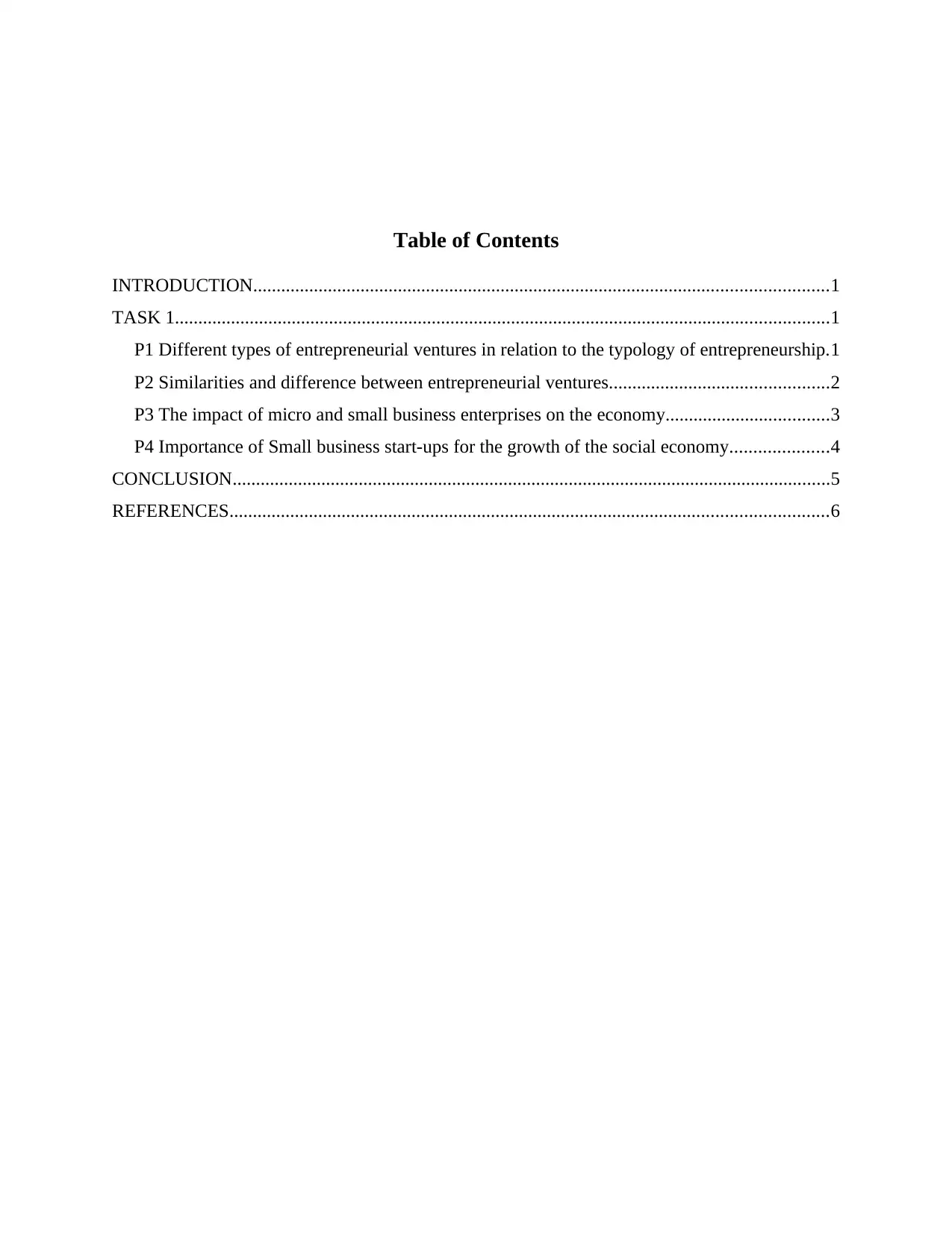
Table of Contents
INTRODUCTION...........................................................................................................................1
TASK 1............................................................................................................................................1
P1 Different types of entrepreneurial ventures in relation to the typology of entrepreneurship.1
P2 Similarities and difference between entrepreneurial ventures...............................................2
P3 The impact of micro and small business enterprises on the economy...................................3
P4 Importance of Small business start-ups for the growth of the social economy.....................4
CONCLUSION................................................................................................................................5
REFERENCES................................................................................................................................6
INTRODUCTION...........................................................................................................................1
TASK 1............................................................................................................................................1
P1 Different types of entrepreneurial ventures in relation to the typology of entrepreneurship.1
P2 Similarities and difference between entrepreneurial ventures...............................................2
P3 The impact of micro and small business enterprises on the economy...................................3
P4 Importance of Small business start-ups for the growth of the social economy.....................4
CONCLUSION................................................................................................................................5
REFERENCES................................................................................................................................6
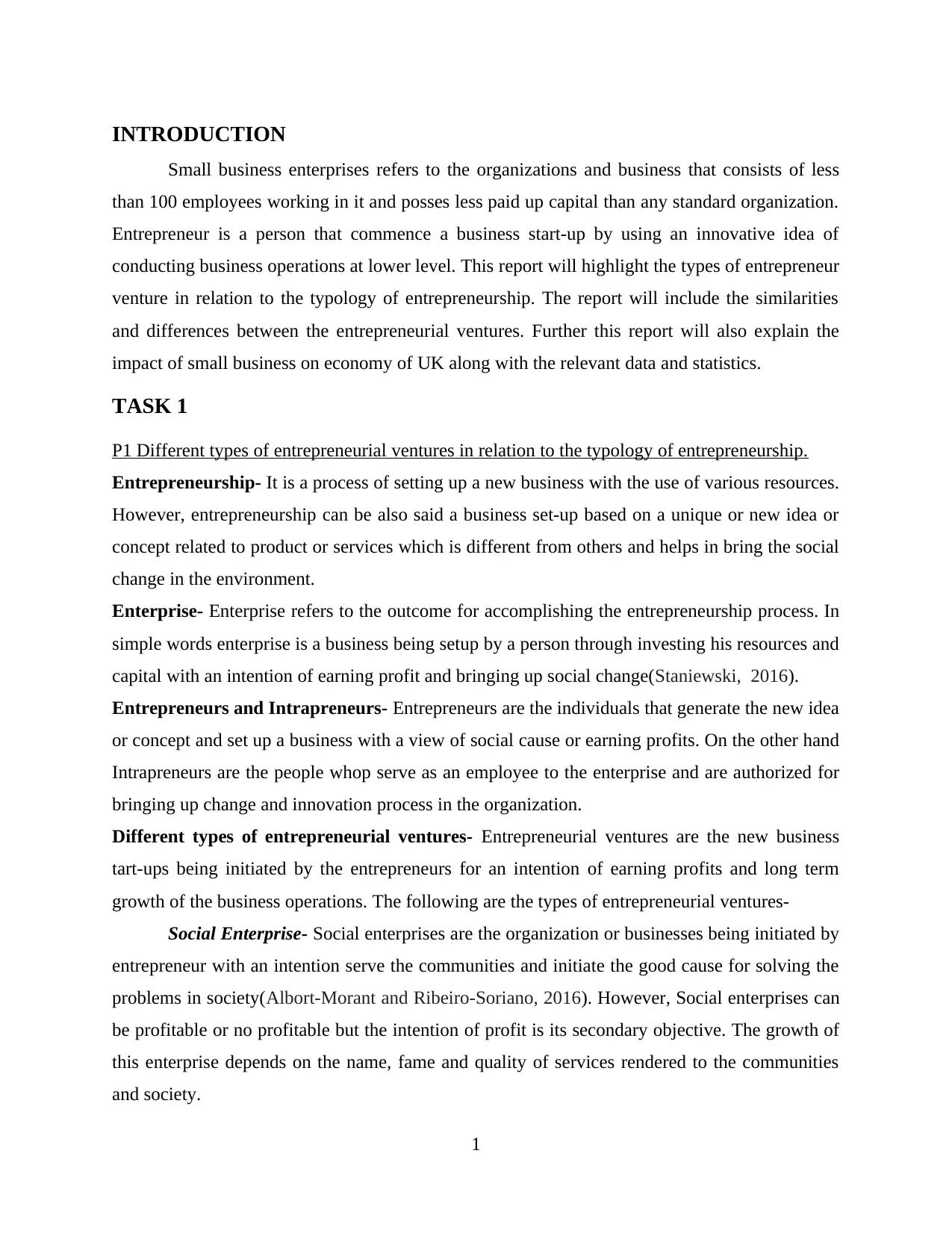
INTRODUCTION
Small business enterprises refers to the organizations and business that consists of less
than 100 employees working in it and posses less paid up capital than any standard organization.
Entrepreneur is a person that commence a business start-up by using an innovative idea of
conducting business operations at lower level. This report will highlight the types of entrepreneur
venture in relation to the typology of entrepreneurship. The report will include the similarities
and differences between the entrepreneurial ventures. Further this report will also explain the
impact of small business on economy of UK along with the relevant data and statistics.
TASK 1
P1 Different types of entrepreneurial ventures in relation to the typology of entrepreneurship.
Entrepreneurship- It is a process of setting up a new business with the use of various resources.
However, entrepreneurship can be also said a business set-up based on a unique or new idea or
concept related to product or services which is different from others and helps in bring the social
change in the environment.
Enterprise- Enterprise refers to the outcome for accomplishing the entrepreneurship process. In
simple words enterprise is a business being setup by a person through investing his resources and
capital with an intention of earning profit and bringing up social change(Staniewski, 2016).
Entrepreneurs and Intrapreneurs- Entrepreneurs are the individuals that generate the new idea
or concept and set up a business with a view of social cause or earning profits. On the other hand
Intrapreneurs are the people whop serve as an employee to the enterprise and are authorized for
bringing up change and innovation process in the organization.
Different types of entrepreneurial ventures- Entrepreneurial ventures are the new business
tart-ups being initiated by the entrepreneurs for an intention of earning profits and long term
growth of the business operations. The following are the types of entrepreneurial ventures-
Social Enterprise- Social enterprises are the organization or businesses being initiated by
entrepreneur with an intention serve the communities and initiate the good cause for solving the
problems in society(Albort-Morant and Ribeiro-Soriano, 2016). However, Social enterprises can
be profitable or no profitable but the intention of profit is its secondary objective. The growth of
this enterprise depends on the name, fame and quality of services rendered to the communities
and society.
1
Small business enterprises refers to the organizations and business that consists of less
than 100 employees working in it and posses less paid up capital than any standard organization.
Entrepreneur is a person that commence a business start-up by using an innovative idea of
conducting business operations at lower level. This report will highlight the types of entrepreneur
venture in relation to the typology of entrepreneurship. The report will include the similarities
and differences between the entrepreneurial ventures. Further this report will also explain the
impact of small business on economy of UK along with the relevant data and statistics.
TASK 1
P1 Different types of entrepreneurial ventures in relation to the typology of entrepreneurship.
Entrepreneurship- It is a process of setting up a new business with the use of various resources.
However, entrepreneurship can be also said a business set-up based on a unique or new idea or
concept related to product or services which is different from others and helps in bring the social
change in the environment.
Enterprise- Enterprise refers to the outcome for accomplishing the entrepreneurship process. In
simple words enterprise is a business being setup by a person through investing his resources and
capital with an intention of earning profit and bringing up social change(Staniewski, 2016).
Entrepreneurs and Intrapreneurs- Entrepreneurs are the individuals that generate the new idea
or concept and set up a business with a view of social cause or earning profits. On the other hand
Intrapreneurs are the people whop serve as an employee to the enterprise and are authorized for
bringing up change and innovation process in the organization.
Different types of entrepreneurial ventures- Entrepreneurial ventures are the new business
tart-ups being initiated by the entrepreneurs for an intention of earning profits and long term
growth of the business operations. The following are the types of entrepreneurial ventures-
Social Enterprise- Social enterprises are the organization or businesses being initiated by
entrepreneur with an intention serve the communities and initiate the good cause for solving the
problems in society(Albort-Morant and Ribeiro-Soriano, 2016). However, Social enterprises can
be profitable or no profitable but the intention of profit is its secondary objective. The growth of
this enterprise depends on the name, fame and quality of services rendered to the communities
and society.
1
⊘ This is a preview!⊘
Do you want full access?
Subscribe today to unlock all pages.

Trusted by 1+ million students worldwide
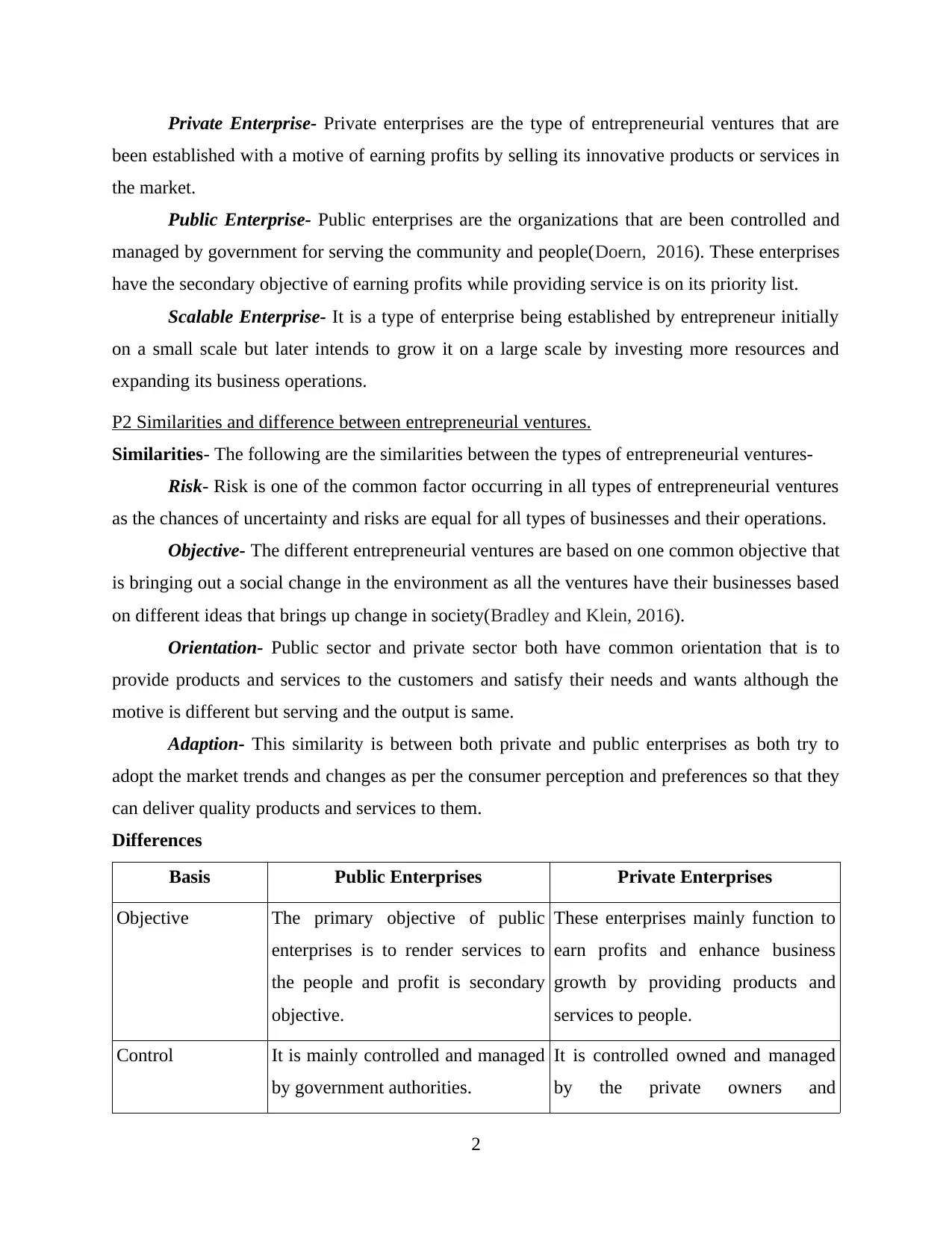
Private Enterprise- Private enterprises are the type of entrepreneurial ventures that are
been established with a motive of earning profits by selling its innovative products or services in
the market.
Public Enterprise- Public enterprises are the organizations that are been controlled and
managed by government for serving the community and people(Doern, 2016). These enterprises
have the secondary objective of earning profits while providing service is on its priority list.
Scalable Enterprise- It is a type of enterprise being established by entrepreneur initially
on a small scale but later intends to grow it on a large scale by investing more resources and
expanding its business operations.
P2 Similarities and difference between entrepreneurial ventures.
Similarities- The following are the similarities between the types of entrepreneurial ventures-
Risk- Risk is one of the common factor occurring in all types of entrepreneurial ventures
as the chances of uncertainty and risks are equal for all types of businesses and their operations.
Objective- The different entrepreneurial ventures are based on one common objective that
is bringing out a social change in the environment as all the ventures have their businesses based
on different ideas that brings up change in society(Bradley and Klein, 2016).
Orientation- Public sector and private sector both have common orientation that is to
provide products and services to the customers and satisfy their needs and wants although the
motive is different but serving and the output is same.
Adaption- This similarity is between both private and public enterprises as both try to
adopt the market trends and changes as per the consumer perception and preferences so that they
can deliver quality products and services to them.
Differences
Basis Public Enterprises Private Enterprises
Objective The primary objective of public
enterprises is to render services to
the people and profit is secondary
objective.
These enterprises mainly function to
earn profits and enhance business
growth by providing products and
services to people.
Control It is mainly controlled and managed
by government authorities.
It is controlled owned and managed
by the private owners and
2
been established with a motive of earning profits by selling its innovative products or services in
the market.
Public Enterprise- Public enterprises are the organizations that are been controlled and
managed by government for serving the community and people(Doern, 2016). These enterprises
have the secondary objective of earning profits while providing service is on its priority list.
Scalable Enterprise- It is a type of enterprise being established by entrepreneur initially
on a small scale but later intends to grow it on a large scale by investing more resources and
expanding its business operations.
P2 Similarities and difference between entrepreneurial ventures.
Similarities- The following are the similarities between the types of entrepreneurial ventures-
Risk- Risk is one of the common factor occurring in all types of entrepreneurial ventures
as the chances of uncertainty and risks are equal for all types of businesses and their operations.
Objective- The different entrepreneurial ventures are based on one common objective that
is bringing out a social change in the environment as all the ventures have their businesses based
on different ideas that brings up change in society(Bradley and Klein, 2016).
Orientation- Public sector and private sector both have common orientation that is to
provide products and services to the customers and satisfy their needs and wants although the
motive is different but serving and the output is same.
Adaption- This similarity is between both private and public enterprises as both try to
adopt the market trends and changes as per the consumer perception and preferences so that they
can deliver quality products and services to them.
Differences
Basis Public Enterprises Private Enterprises
Objective The primary objective of public
enterprises is to render services to
the people and profit is secondary
objective.
These enterprises mainly function to
earn profits and enhance business
growth by providing products and
services to people.
Control It is mainly controlled and managed
by government authorities.
It is controlled owned and managed
by the private owners and
2
Paraphrase This Document
Need a fresh take? Get an instant paraphrase of this document with our AI Paraphraser
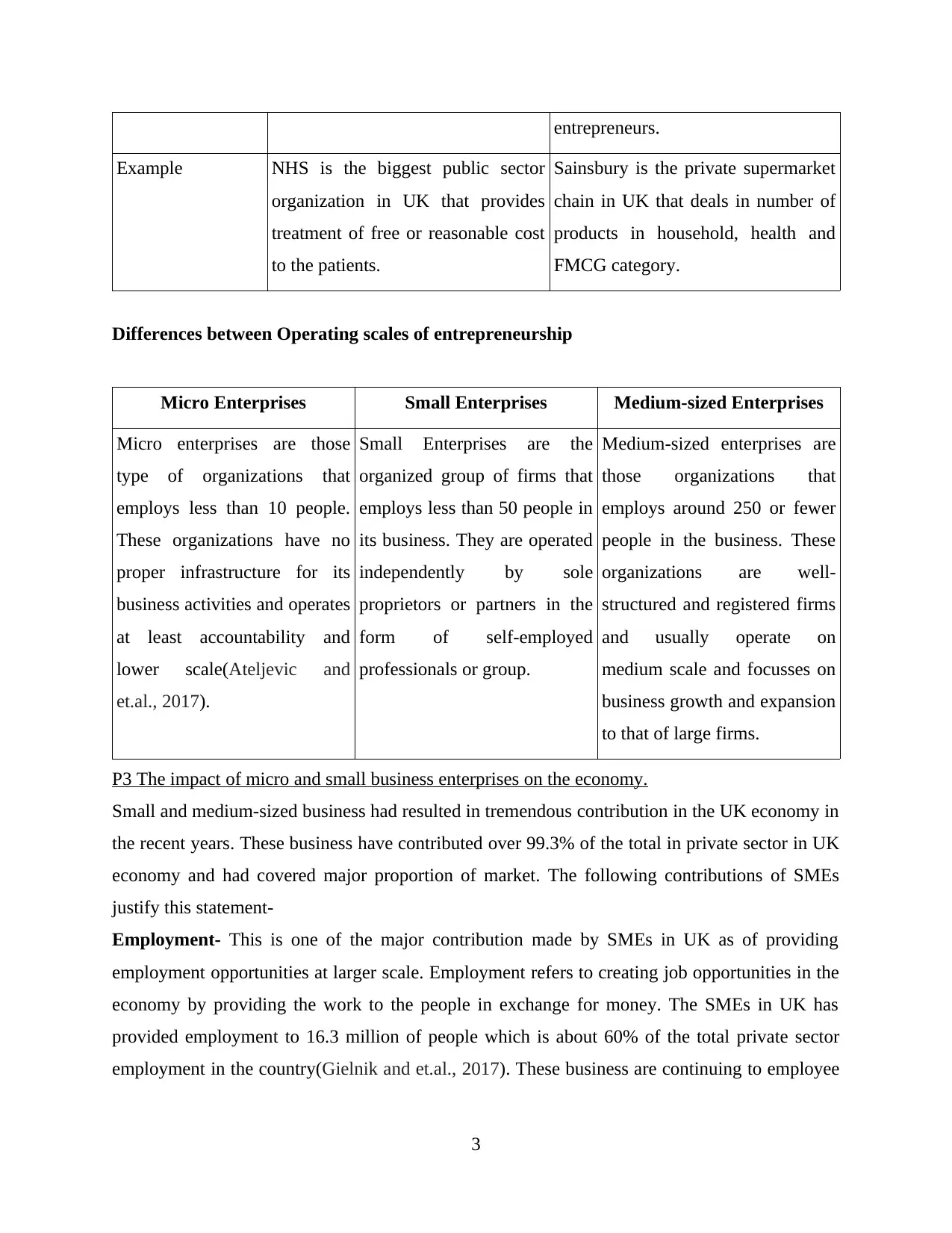
entrepreneurs.
Example NHS is the biggest public sector
organization in UK that provides
treatment of free or reasonable cost
to the patients.
Sainsbury is the private supermarket
chain in UK that deals in number of
products in household, health and
FMCG category.
Differences between Operating scales of entrepreneurship
Micro Enterprises Small Enterprises Medium-sized Enterprises
Micro enterprises are those
type of organizations that
employs less than 10 people.
These organizations have no
proper infrastructure for its
business activities and operates
at least accountability and
lower scale(Ateljevic and
et.al., 2017).
Small Enterprises are the
organized group of firms that
employs less than 50 people in
its business. They are operated
independently by sole
proprietors or partners in the
form of self-employed
professionals or group.
Medium-sized enterprises are
those organizations that
employs around 250 or fewer
people in the business. These
organizations are well-
structured and registered firms
and usually operate on
medium scale and focusses on
business growth and expansion
to that of large firms.
P3 The impact of micro and small business enterprises on the economy.
Small and medium-sized business had resulted in tremendous contribution in the UK economy in
the recent years. These business have contributed over 99.3% of the total in private sector in UK
economy and had covered major proportion of market. The following contributions of SMEs
justify this statement-
Employment- This is one of the major contribution made by SMEs in UK as of providing
employment opportunities at larger scale. Employment refers to creating job opportunities in the
economy by providing the work to the people in exchange for money. The SMEs in UK has
provided employment to 16.3 million of people which is about 60% of the total private sector
employment in the country(Gielnik and et.al., 2017). These business are continuing to employee
3
Example NHS is the biggest public sector
organization in UK that provides
treatment of free or reasonable cost
to the patients.
Sainsbury is the private supermarket
chain in UK that deals in number of
products in household, health and
FMCG category.
Differences between Operating scales of entrepreneurship
Micro Enterprises Small Enterprises Medium-sized Enterprises
Micro enterprises are those
type of organizations that
employs less than 10 people.
These organizations have no
proper infrastructure for its
business activities and operates
at least accountability and
lower scale(Ateljevic and
et.al., 2017).
Small Enterprises are the
organized group of firms that
employs less than 50 people in
its business. They are operated
independently by sole
proprietors or partners in the
form of self-employed
professionals or group.
Medium-sized enterprises are
those organizations that
employs around 250 or fewer
people in the business. These
organizations are well-
structured and registered firms
and usually operate on
medium scale and focusses on
business growth and expansion
to that of large firms.
P3 The impact of micro and small business enterprises on the economy.
Small and medium-sized business had resulted in tremendous contribution in the UK economy in
the recent years. These business have contributed over 99.3% of the total in private sector in UK
economy and had covered major proportion of market. The following contributions of SMEs
justify this statement-
Employment- This is one of the major contribution made by SMEs in UK as of providing
employment opportunities at larger scale. Employment refers to creating job opportunities in the
economy by providing the work to the people in exchange for money. The SMEs in UK has
provided employment to 16.3 million of people which is about 60% of the total private sector
employment in the country(Gielnik and et.al., 2017). These business are continuing to employee
3
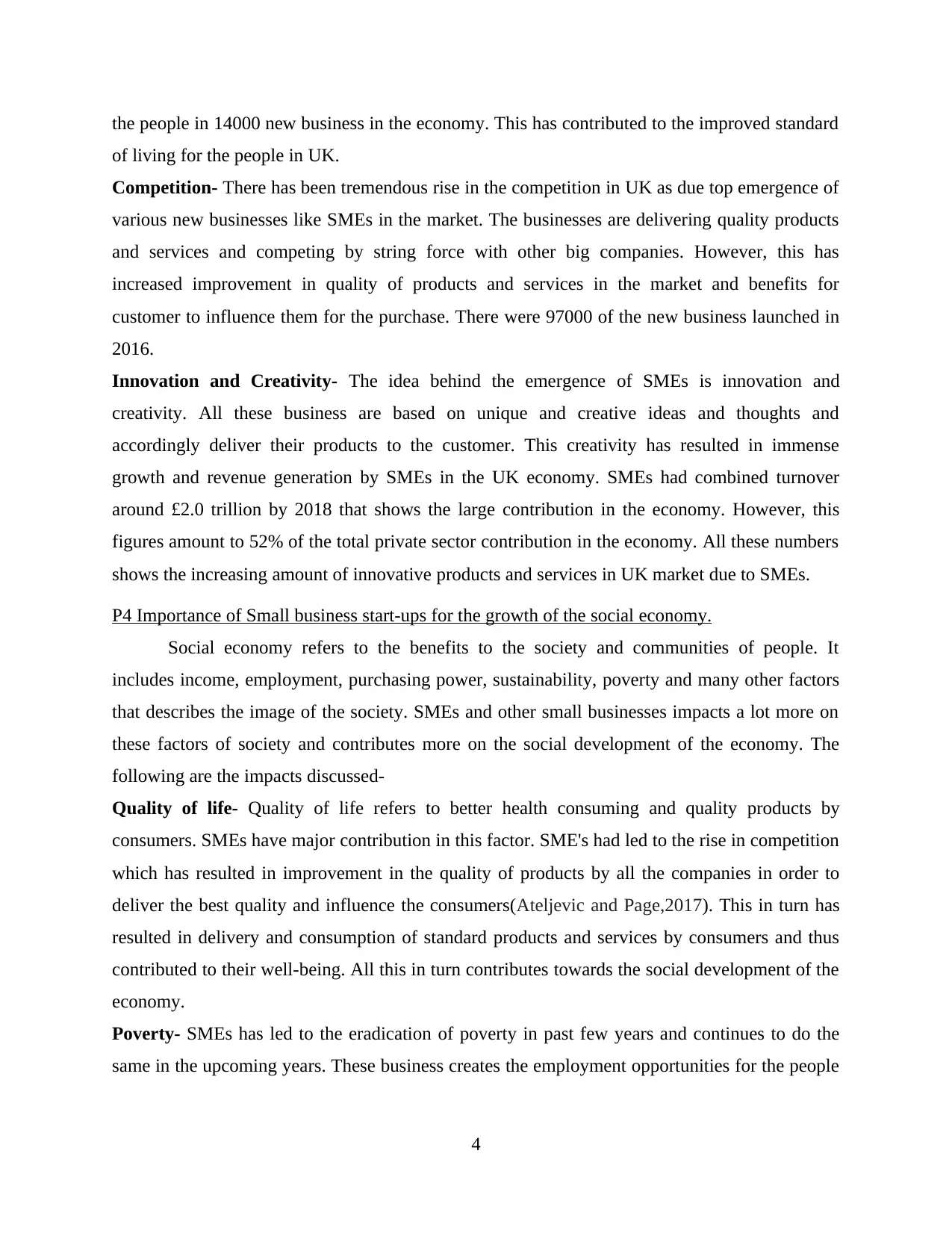
the people in 14000 new business in the economy. This has contributed to the improved standard
of living for the people in UK.
Competition- There has been tremendous rise in the competition in UK as due top emergence of
various new businesses like SMEs in the market. The businesses are delivering quality products
and services and competing by string force with other big companies. However, this has
increased improvement in quality of products and services in the market and benefits for
customer to influence them for the purchase. There were 97000 of the new business launched in
2016.
Innovation and Creativity- The idea behind the emergence of SMEs is innovation and
creativity. All these business are based on unique and creative ideas and thoughts and
accordingly deliver their products to the customer. This creativity has resulted in immense
growth and revenue generation by SMEs in the UK economy. SMEs had combined turnover
around £2.0 trillion by 2018 that shows the large contribution in the economy. However, this
figures amount to 52% of the total private sector contribution in the economy. All these numbers
shows the increasing amount of innovative products and services in UK market due to SMEs.
P4 Importance of Small business start-ups for the growth of the social economy.
Social economy refers to the benefits to the society and communities of people. It
includes income, employment, purchasing power, sustainability, poverty and many other factors
that describes the image of the society. SMEs and other small businesses impacts a lot more on
these factors of society and contributes more on the social development of the economy. The
following are the impacts discussed-
Quality of life- Quality of life refers to better health consuming and quality products by
consumers. SMEs have major contribution in this factor. SME's had led to the rise in competition
which has resulted in improvement in the quality of products by all the companies in order to
deliver the best quality and influence the consumers(Ateljevic and Page,2017). This in turn has
resulted in delivery and consumption of standard products and services by consumers and thus
contributed to their well-being. All this in turn contributes towards the social development of the
economy.
Poverty- SMEs has led to the eradication of poverty in past few years and continues to do the
same in the upcoming years. These business creates the employment opportunities for the people
4
of living for the people in UK.
Competition- There has been tremendous rise in the competition in UK as due top emergence of
various new businesses like SMEs in the market. The businesses are delivering quality products
and services and competing by string force with other big companies. However, this has
increased improvement in quality of products and services in the market and benefits for
customer to influence them for the purchase. There were 97000 of the new business launched in
2016.
Innovation and Creativity- The idea behind the emergence of SMEs is innovation and
creativity. All these business are based on unique and creative ideas and thoughts and
accordingly deliver their products to the customer. This creativity has resulted in immense
growth and revenue generation by SMEs in the UK economy. SMEs had combined turnover
around £2.0 trillion by 2018 that shows the large contribution in the economy. However, this
figures amount to 52% of the total private sector contribution in the economy. All these numbers
shows the increasing amount of innovative products and services in UK market due to SMEs.
P4 Importance of Small business start-ups for the growth of the social economy.
Social economy refers to the benefits to the society and communities of people. It
includes income, employment, purchasing power, sustainability, poverty and many other factors
that describes the image of the society. SMEs and other small businesses impacts a lot more on
these factors of society and contributes more on the social development of the economy. The
following are the impacts discussed-
Quality of life- Quality of life refers to better health consuming and quality products by
consumers. SMEs have major contribution in this factor. SME's had led to the rise in competition
which has resulted in improvement in the quality of products by all the companies in order to
deliver the best quality and influence the consumers(Ateljevic and Page,2017). This in turn has
resulted in delivery and consumption of standard products and services by consumers and thus
contributed to their well-being. All this in turn contributes towards the social development of the
economy.
Poverty- SMEs has led to the eradication of poverty in past few years and continues to do the
same in the upcoming years. These business creates the employment opportunities for the people
4
⊘ This is a preview!⊘
Do you want full access?
Subscribe today to unlock all pages.

Trusted by 1+ million students worldwide
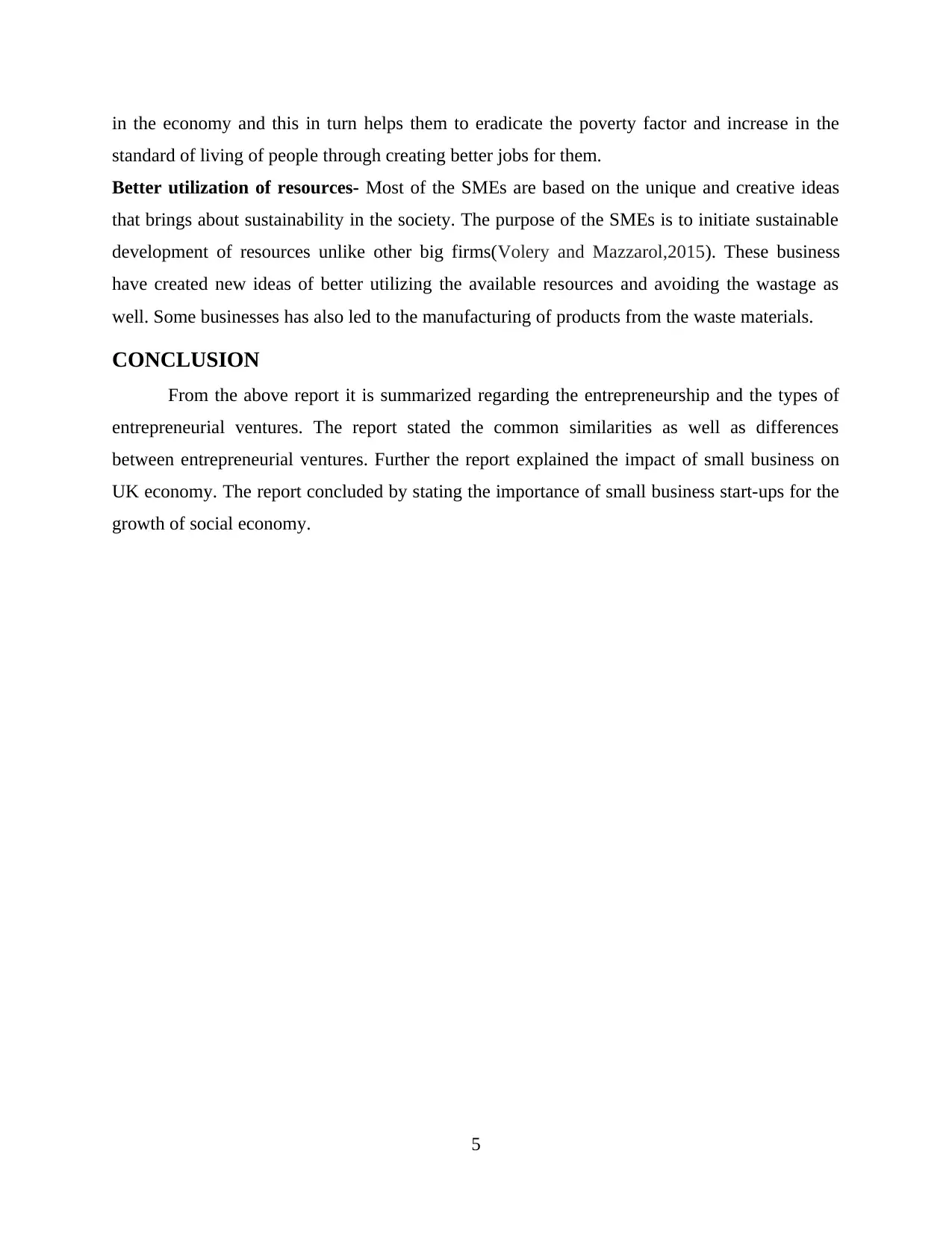
in the economy and this in turn helps them to eradicate the poverty factor and increase in the
standard of living of people through creating better jobs for them.
Better utilization of resources- Most of the SMEs are based on the unique and creative ideas
that brings about sustainability in the society. The purpose of the SMEs is to initiate sustainable
development of resources unlike other big firms(Volery and Mazzarol,2015). These business
have created new ideas of better utilizing the available resources and avoiding the wastage as
well. Some businesses has also led to the manufacturing of products from the waste materials.
CONCLUSION
From the above report it is summarized regarding the entrepreneurship and the types of
entrepreneurial ventures. The report stated the common similarities as well as differences
between entrepreneurial ventures. Further the report explained the impact of small business on
UK economy. The report concluded by stating the importance of small business start-ups for the
growth of social economy.
5
standard of living of people through creating better jobs for them.
Better utilization of resources- Most of the SMEs are based on the unique and creative ideas
that brings about sustainability in the society. The purpose of the SMEs is to initiate sustainable
development of resources unlike other big firms(Volery and Mazzarol,2015). These business
have created new ideas of better utilizing the available resources and avoiding the wastage as
well. Some businesses has also led to the manufacturing of products from the waste materials.
CONCLUSION
From the above report it is summarized regarding the entrepreneurship and the types of
entrepreneurial ventures. The report stated the common similarities as well as differences
between entrepreneurial ventures. Further the report explained the impact of small business on
UK economy. The report concluded by stating the importance of small business start-ups for the
growth of social economy.
5
Paraphrase This Document
Need a fresh take? Get an instant paraphrase of this document with our AI Paraphraser
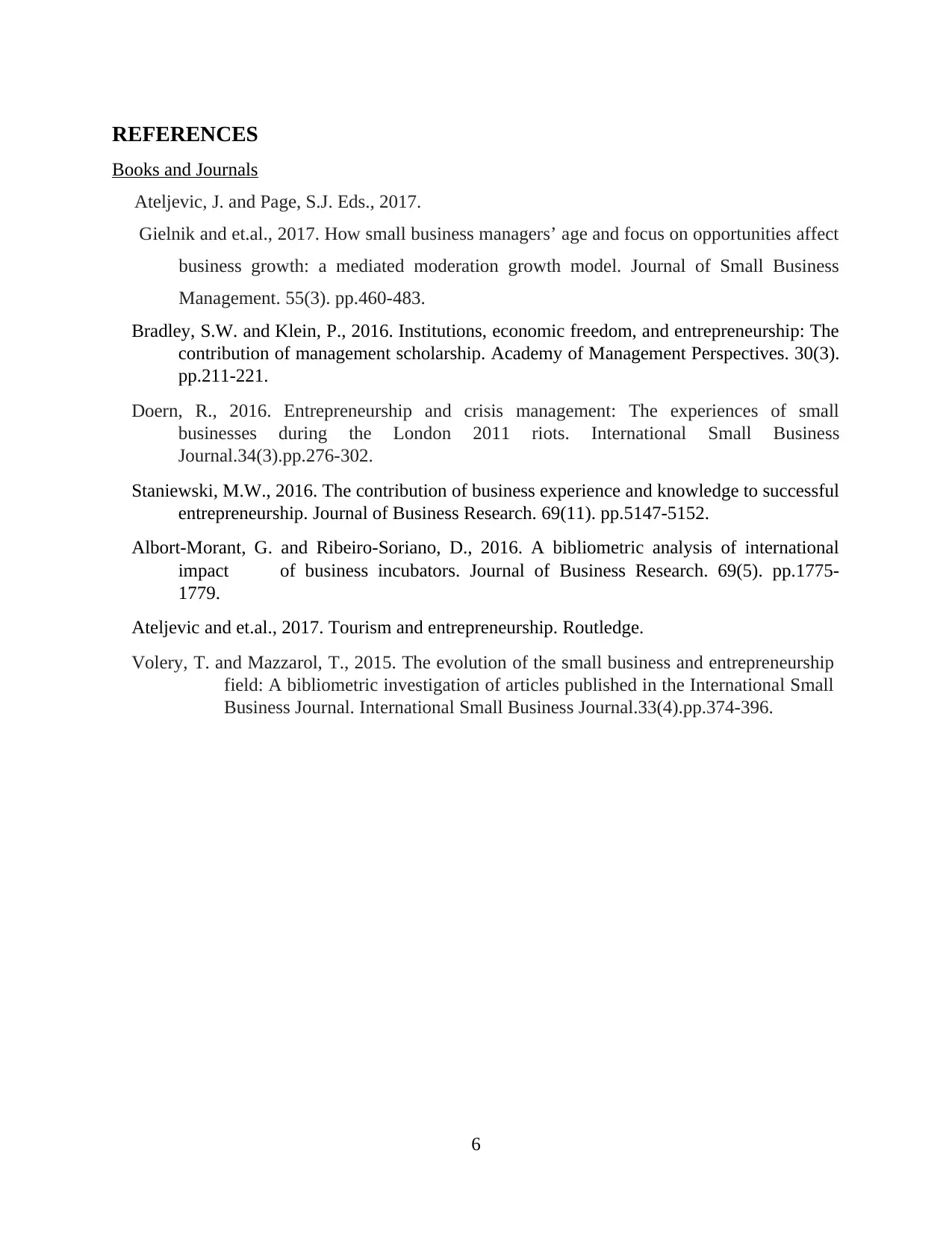
REFERENCES
Books and Journals
Ateljevic, J. and Page, S.J. Eds., 2017.
Gielnik and et.al., 2017. How small business managers’ age and focus on opportunities affect
business growth: a mediated moderation growth model. Journal of Small Business
Management. 55(3). pp.460-483.
Bradley, S.W. and Klein, P., 2016. Institutions, economic freedom, and entrepreneurship: The
contribution of management scholarship. Academy of Management Perspectives. 30(3).
pp.211-221.
Doern, R., 2016. Entrepreneurship and crisis management: The experiences of small
businesses during the London 2011 riots. International Small Business
Journal.34(3).pp.276-302.
Staniewski, M.W., 2016. The contribution of business experience and knowledge to successful
entrepreneurship. Journal of Business Research. 69(11). pp.5147-5152.
Albort-Morant, G. and Ribeiro-Soriano, D., 2016. A bibliometric analysis of international
impact of business incubators. Journal of Business Research. 69(5). pp.1775-
1779.
Ateljevic and et.al., 2017. Tourism and entrepreneurship. Routledge.
Volery, T. and Mazzarol, T., 2015. The evolution of the small business and entrepreneurship
field: A bibliometric investigation of articles published in the International Small
Business Journal. International Small Business Journal.33(4).pp.374-396.
6
Books and Journals
Ateljevic, J. and Page, S.J. Eds., 2017.
Gielnik and et.al., 2017. How small business managers’ age and focus on opportunities affect
business growth: a mediated moderation growth model. Journal of Small Business
Management. 55(3). pp.460-483.
Bradley, S.W. and Klein, P., 2016. Institutions, economic freedom, and entrepreneurship: The
contribution of management scholarship. Academy of Management Perspectives. 30(3).
pp.211-221.
Doern, R., 2016. Entrepreneurship and crisis management: The experiences of small
businesses during the London 2011 riots. International Small Business
Journal.34(3).pp.276-302.
Staniewski, M.W., 2016. The contribution of business experience and knowledge to successful
entrepreneurship. Journal of Business Research. 69(11). pp.5147-5152.
Albort-Morant, G. and Ribeiro-Soriano, D., 2016. A bibliometric analysis of international
impact of business incubators. Journal of Business Research. 69(5). pp.1775-
1779.
Ateljevic and et.al., 2017. Tourism and entrepreneurship. Routledge.
Volery, T. and Mazzarol, T., 2015. The evolution of the small business and entrepreneurship
field: A bibliometric investigation of articles published in the International Small
Business Journal. International Small Business Journal.33(4).pp.374-396.
6

7
⊘ This is a preview!⊘
Do you want full access?
Subscribe today to unlock all pages.

Trusted by 1+ million students worldwide
1 out of 9
Related Documents
Your All-in-One AI-Powered Toolkit for Academic Success.
+13062052269
info@desklib.com
Available 24*7 on WhatsApp / Email
![[object Object]](/_next/static/media/star-bottom.7253800d.svg)
Unlock your academic potential
Copyright © 2020–2026 A2Z Services. All Rights Reserved. Developed and managed by ZUCOL.





